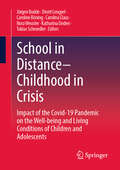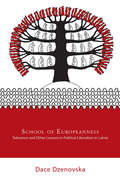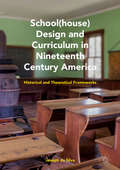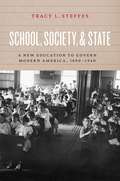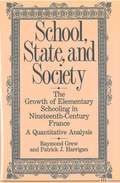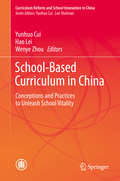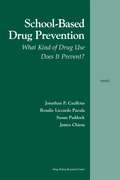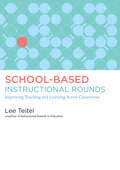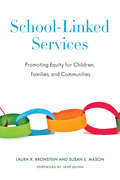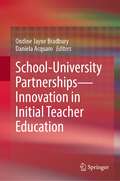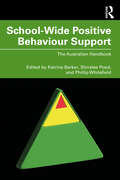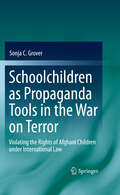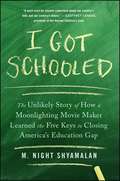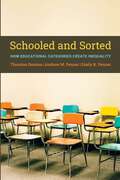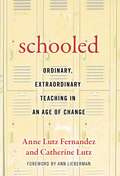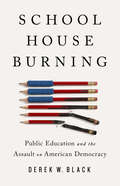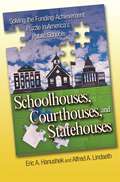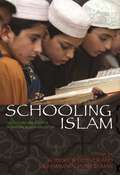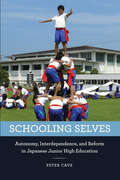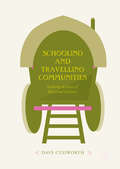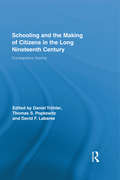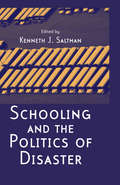- Table View
- List View
School in Distance – Childhood in Crisis: Impact of the Covid-19 Pandemic on the Well-being and Living Conditions of Children and Adolescents
by Jürgen Budde Nora Weuster Tobias Schroedler Drorit Lengyel Caroline Böning Carolina Claus Katharina DodenThe volume reevaluates the common notions of a good childhood, which are influenced in various ways by the Covid-19 pandemic. The perspectives of children and adolescents on the pandemic have rarely been the subject of discussion. Thematically, this volume focuses on questions of well-being, inequality, and the familialization of learning. The aim is to explicitly direct attention to the practical living conditions of children and families and to strengthen their viewpoint.
School of Europeanness: Tolerance and Other Lessons in Political Liberalism in Latvia
by Dace DzenovskaIn School of Europeanness, Dace Dzenovska argues that Europe’s political landscape is shaped by a fundamental tension between the need to exclude and the requirement to profess and institutionalize the value of inclusion. Nowhere, Dzenovska writes, is this tension more glaring than in the former Soviet Republics.Using Latvia as a representative case, School of Europeanness is a historical ethnography of the tolerance work undertaken in that country as part of postsocialist democratization efforts. Dzenovska contends that the collapse of socialism and the resurgence of Latvian nationalism gave this Europe-wide logic new life, simultaneously reproducing and challenging it. Her work makes explicit what is only implied in the 1977 Kraftwerk song, "Europe Endless": hierarchies prevail in European public and political life even as tolerance is touted by politicians and pundits as one of Europe’s chief virtues.School of Europeanness shows how post–Cold War liberalization projects in Latvia contributed to the current crisis of political liberalism in Europe, providing deep ethnographic analysis of the power relations in Latvia and the rest of Europe, and identifying the tension between exclusive polities and inclusive values as foundational of Europe’s political landscape.
School(house) Design and Curriculum in Nineteenth Century America: Historical and Theoretical Frameworks
by Joseph Da SilvaThis book examines the formative relationship between nineteenth century American school architecture and curriculum. While other studies have queried the intersections of school architecture and curriculum, they approach them without consideration for the ways in which their relationships are culturally formative—or how they reproduce or resist extant inequities in the United States. Da Silva addresses this gap in the school design archive with a cross-disciplinary approach, taking to task the cultural consequences of the relationship between these two primary elements of teaching and learning in a ‘hotspot’ of American education—the nineteenth century. Providing a historical and theoretical framework for practitioners and scholars in evaluating the politics of modern American school design, the book holds a mirror to the oft-criticized state of American education today.
School, Family, and Community Partnerships
by Joyce L EpsteinHow can teachers and administrators be prepared to create partnerships with families and communities? Nationwide, rhetoric in favor of parent involvement is high, but the quality of most programs still is low. Part of the problem is that most teacher education, administrative training, and other education of school professionals omit topics of school, family, and community partnerships. Instead, educators are prepared in limited ways to "deal with parents" when problems occur.Well-known and respected author Joyce Epstein updates her acclaimed School, Family, and Community Partnerships to reflect the past ten years of study and advancements. New readings address this growing field and offer expanded consideration of district leadership and its impact on school programs. Epstein contends it is now possible to prepare teachers and administrators with a solid base of knowledge on partnerships. Theoretical perspectives and results from research and development can and should be shared with educators. As partners, parents and teachers share responsibility for the education and development of their children. Common messages and collaborative activities of home and school help to promote student success, prevent problems, and solve those that arise. Epstein provides the material needed to help current educators and educators in training think about, talk about, and then act to develop comprehensive programs of school, family, and community partnerships.This collection is designed for use in courses of teacher education, preparation of school administrators, and other courses that prepare professionals to understand and to work in schools and with families and students. It is a definitive resource both in and out of the classroom with comments, discussion questions, activities, and field experiences in each of the chapters.
School, Family, and Community Partnerships
by Joyce L. EpsteinFor undergraduate and graduate students in education, psychology, sociology, and educational administration, Epstein (sociology, Johns Hopkins U. ) brings together 18 readings that describe how teachers and administrators can create positive and productive partnerships with families and communities. The readings address the theory, research, policy, and practice of these partnerships, along with comments, discussions, activities, and projects (many added or updated for this edition). This edition also has new and updated material that incorporates recent research and includes a literature review of new directions for partnership program developments, a summary of research on homework, and new approaches to district and state-level leadership and policies. Annotation ©2011 Book News, Inc. , Portland, OR (booknews. com)
School, Society, & State: A New Education to Govern Modern America,1890-1940
by Steffes Tracy L."Democracy has to be born anew every generation, and education is its midwife," wrote John Dewey in his classic work The School and Society. In School, Society, and State, Tracy Steffes places that idea at the center of her exploration of the connections between public school reform in the early twentieth century and American political development from 1890 to 1940. American public schooling, Steffes shows, was not merely another reform project of the Progressive Era, but a central one. She addresses why Americans invested in public education and explains how an array of reformers subtly transformed schooling into a tool of social governance to address the consequences of industrialization and urbanization. By extending the reach of schools, broadening their mandate, and expanding their authority over the well-being of children, the state assumed a defining role in the education--and in the lives--of American families. In School, Society, and State, Steffes returns the state to the study of the history of education and brings the schools back into our discussion of state power during a pivotal moment in American political development.
School, Society, and State: A New Education to Govern Modern America, 1890-1940
by Tracy L. Steffes“Democracy has to be born anew every generation, and education is its midwife,” wrote John Dewey in his classic work The School and Society. In School, Society, and State, Tracy Steffes places that idea at the center of her exploration of the connections between public school reform in the early twentieth century and American political development from 1890 to 1940.American public schooling, Steffes shows, was not merely another reform project of the Progressive Era, but a central one. She addresses why Americans invested in public education and explains how an array of reformers subtly transformed schooling into a tool of social governance to address the consequences of industrialization and urbanization. By extending the reach of schools, broadening their mandate, and expanding their authority over the well-being of children, the state assumed a defining role in the education—and in the lives—of American families.In School, Society, and State, Steffes returns the state to the study of the history of education and brings the schools back into our discussion of state power during a pivotal moment in American political development.
School, State, and Society: A Quantitative Analysis
by Raymond Grew Patrick J. HarriganA study of elementary education in France in the 1800s
School-Based Curriculum in China: Conceptions and Practices to Unleash School Vitality (Curriculum Reform and School Innovation in China)
by Yunhuo Cui Hao Lei Wenye ZhouThis book first develops a framework to understand the curriculum administration system in China. It describes the historical process of localizing school-based curricula as well as the significance and positioning of school-based curricula, and presents in detail cases of how three types of school-based curriculum were developed and implemented in Chinese schools.The book outlines for the first time best practices in school-based curriculum development in China, i.e. how to make a holistic curriculum plan, how to design a curriculum, and how to develop a course in the context of a school-based curriculum. By discussing these three aspects, it clearly summarizes the strategies and technologies for school-based curriculum development, which are applicable across contexts.Although the concept originated outside China, school-based curriculum development in China differs from that in other countries both in theory and practice. This book equips readers with theoretical and practical knowledge of how to develop school-based curricula and how to generate experiences for new curriculum development.This timely book is a valuable resource for researchers, curriculum designers, school teachers and others who are interested in school-based curriculum development.
School-Based Drug Prevention
by James Chiesa Rosalie Liccardo Pacula Jonathan P. Caulkins Susan M. PaddockSchool-based drug prevention, popular with the public and politicians alike, is now a nearly universal experience for American youth. Analysis has shown that the best programs can reduce use of a wide range of substances. But questions remain regarding how to think about and, hence, fund, these programs. Should they be viewed principally as weapons in the war against illicit drugs, or, at the other extreme, do prevention programs benefit students and society most by reducing use of alcohol and tobacco? The authors address these questions by comparing for the first time the social benefits of school-based prevention programs' long-run impacts on a diverse set of different substances.
School-Based Instructional Rounds: Improving Teaching and Learning Across Classrooms
by Lee TeitelIn School-Based Instructional Rounds, Teitel offers detailed case studies of five different models of school-based rounds and investigates critical learning from each. Instructional rounds—one of the most innovative and powerful approaches to improving teaching and learning—has been taken up by districts across the country and around the world. Now Lee Teitel, an originator of this transformative practice, explores one of the most promising ways in which it is being adapted in the field: implementing instructional rounds networks within, rather than across, K–12 schools. In School-Based Instructional Rounds, Teitel offers detailed case studies of five different models of school-based rounds and investigates critical learning from each. Expanding rounds to include teachers, for instance, offers opportunities for a more direct connection to instructional improvement. Other areas of experimentation include increasing the frequency of visits, engaging participants across diverse roles, and modifying the structure or focus of rounds work.School-Based Instructional Rounds represents an invaluable resource for educators involved in instructional rounds. It marks a significant addition to the literature on this evolving practice."
School-Linked Services: Promoting Equity for Children, Families, and Communities
by Laura Bronstein Susan MasonThe evidence-based strategies in this volume close the achievement gap among students from all sociological backgrounds. Designed according to local needs assessments, they provide the services, programs, initiatives, and relationships that are crucial for children's success in school and life.These practices and programs include afterschool and summer sessions, early-childhood education, school-linked health and mental health services, family engagement, and youth leadership opportunities. This book addresses the policy and funding requirements that help these partnerships thrive and offers effective counterarguments against those who would question their value. The text describes strategies that work in both rural and urban contexts and includes a chapter evaluating school-community partnerships across the world. Because it involves collaborations across professions and organizations, the book's interdisciplinary approach will appeal to those in social work, education, psychology, public health, counseling, nursing, and public policy.
School-University Partnerships—Innovation in Initial Teacher Education
by Ondine Jayne Bradbury Daniela AcquaroThis book showcases models of Australian school–university partnerships which, in their development, respond to, and aim to move beyond the principles and practices of current partnership mandates in initial teacher education. Supported by government policy, these partnerships reveal innovative ways of working across multiple stakeholder groups within a range of unique school-university partnership contexts. Each of the examples of school-university partnerships within this edited collection provide insights into the power and potential of cross-sectoral vision, collaboration and growth, drawing upon research evidence and impact data that points to the mutual benefits experienced by all stakeholders. Across its ten chapters, this book explores various examples of partnerships, and forms an important reference for all initial teacher education providers, schools, and educational stakeholders; as school–university partnerships necessitate the way these sectors connect, learn from one another, and inform future practice.
School-Wide Positive Behaviour Support: The Australian Handbook
by Katrina Barker Shiralee Poed Phillip WhitefieldDrawing upon twenty years of experience putting the Positive Behaviour Support (PBS) framework into practice, this is the first definitive handbook to document the ways in which Australian schools have embraced and applied school-wide PBS, and to provide guidance on implementation. Written by key Australian researchers and implementers with extensive expertise, School-Wide Positive Behaviour Support: The Australian Handbook is an important contribution to the work of school leaders and teachers. This book illustrates the significant contribution of PBS to improving schools and the potential for its systems approach to be expanded across education systems. The book’s structure corresponds to the theme of a continuum of supports, addressing the key conceptual foundations of PBS and its representation within school-wide implementation. Each chapter comprises a mix of research, practical case studies and examples, and features learning intentions, keywords, further reading, advice on applying your ideas, and links to the Australian Professional Standards for Teachers. PBS has gained significant attention in Australia over the past two decades and its principles now underpin many successful systems and practices in schools and community and disability services. This book will be a foundational resource for implementers and coaches of PBS, educational leaders and policy advisors, pre- and in-service teachers, as well as researchers.
Schoolchildren as Propaganda Tools in the War on Terror
by Sonja C. GroverThis book explores in what ways both sides involved in the so-called war on terror are using schoolchildren as propaganda tools while putting the children's security at grave risk. The book explores how terrorists use attacks on education to attempt to destabilize the government while the government and the international aid community use increases in school attendance as an ostensible index of largely illusory progress in the overall security situation and in development. The book challenges the notion that unoccupied civilian schools are not entitled under the law of armed conflict to a high standard of protection which prohibits their use for military purposes. Also examined are the potential violations of international law that can occur when government and education aid workers encourage and facilitate school attendance, as they do, in areas within conflict-affected states such as Afghanistan where security for education is inadequate and the risk of terror attacks on education high.
Schooled
by M. Night ShyamalanIn this vital new book, the famed filmmaker tells how his passion for education reform led him to learn that there are five tested, indispensable keys to transforming America's underperforming schools.When he was scouting locations for a film, M. Night Shyamalan spent time in two Philadelphia-area schools--one a welcoming institution, the other a building with metal detectors, windows with bars, and locked classroom doors. The striking difference resonated with the filmmaker, convincing him to become more involved in education reform. Now, after years of dedicating himself to the issue and consulting with America's leading education experts and reformers, he has found something astonishing in the research. Schools are closing the achievement gap in poor neighborhoods all across the country, more than fifty of which are identified in Schooled. What they have in common are five distinct practices, similar to, and inspired by, the keys to a healthy lifestyle: Each one necessary, no one sufficient. These five, identified by the Shyamalan family foundation's researchers are: Longer Hours, whether an increased school day, or extended year; Small Schools; using evidence-tested teaching methods via Data-Driven Instruction; Leaders who spend their time on instruction instead of administration; and identifying and retaining the Best Teachers, including a fresh approach to the tenure system. Shyamalan embarked on this project with no preconceived notions, hoping only to learn which methods succeed. Working closely with experts, he has produced a book based solely on empirical data--a guide that should inform America's ongoing debate about how to improve our educational system.
Schooled and Sorted: How Educational Categories Create Inequality
by Thurston Domina Andrew M. Penner Emily K. PennerSociety primarily views education as a way to teach students skills and knowledge that they will draw upon as they move into their adult lives. However, schools do more than educate students – they also place students into categories, such as kindergartner, English language learner, and honor roll student. But do these categories have larger consequences than simply sorting students into classrooms? In Schooled & Sorted Thurston Domina, Andrew M. Penner, and Emily K. Penner, explore how educational categories reify and reinforce powerful existing social categories – including race, ethnicity, and class – and ultimately reproduce social and economic inequality in broader society. Domina and colleagues argue that while education is often seen as a tool for social mobility and reducing inequality, categories used in schools shape students’ access to resources, which ultimately have far-reaching impacts on their lives. The authors assert that the classes students are sorted into influence their educational experiences – students who are placed in higher-tracked classes are believed to have stronger academic skills than students in lower-tracked classes. As a result, more resources are often devoted to students in higher-tracked classes. Because many measures of academic achievement reflect values of the status quo, white, affluent students are overrepresented in these track assignments, leading to a reproduction of societal status and resource inequality within schools. This inequality within schools translates into lasting inequalities in the adult world. Society views educational achievement to be based on merit – high achievers have done well because they worked hard and are rewarded with resources, status, and power, including high-paying, high-status jobs at prestigious organizations. Those with lower educational status, on the other hand, are seen as undeserving and are therefore sorted into lower-paid jobs in lower-status professions and hold less influence. Domina and colleagues contend, however, that while educational categorization is unavoidable, a more equitable system, and thus a more equitable society, can be built. A key component is to build and uphold categories that emphasize educational goods that are inherently valuable, such as the ability to read, as opposed to those that derive value from scarcity, such as status and prestige. Schooled & Sorted is an illuminating investigation into the ways sorting within schools translates to sorting – and inequality – into the larger world.
Schooled: Ordinary, Extraordinary Teaching in an Age of Change
by Catherine Lutz Anne FernandezDepicted variously as heroes, villains, or victims, America’s teachers find themselves at the center of a sometimes nasty policy debate. Yet, while politicians, reformers, and pundits contribute to the cacophony that serves as our national conversation about education, those who teach our children everyday are barely heard over the noise. This beautifully written book highlights working teachers speaking on many key educational problems under debate as well as many of the controversial solutions put forth, including revamped teacher evaluations, curricular standardization, and increased testing and data collection. Anthropologist Catherine Lutz and high school teacher Anne Lutz Fernandez traveled the country to meet a wide range of educators on the frontlines of teaching across diverse contexts―from traditional public schools to charters to the home school; early in careers and near retirement; in city, town, suburb, and country. What they learned about teaching and learning provides critical insights not just for educators but for anyone interested in American education.
Schoolhouse Burning: Public Education and the Assault on American Democracy
by Derek W. BlackThe full-scale assault on public education threatens not just public education but American democracy itself Public education as we know it is in trouble. Derek W. Black, a legal scholar and tenacious advocate, shows how major democratic and constitutional developments are intimately linked to the expansion of public education throughout American history. Schoolhouse Burning is grounded in pathbreaking, original research into how the nation, in its infancy, built itself around public education and, following the Civil War, enshrined education as a constitutional right that forever changed the trajectory of our democracy. Public education, alongside the right to vote, was the cornerstone of the recovery of the war-torn nation. Today's current schooling trends -- the declining commitment to properly fund public education and the well-financed political agenda to expand vouchers and charter schools -- present a major assault on the democratic norms that public education represents and risk undermining one of the unique accomplishments of American society.
Schoolhouses, Courthouses, and Statehouses: Solving the Funding-Achievement Puzzle in America's Public Schools
by Eric A. Hanushek Alfred A. LindsethImproving public schools through performance-based fundingSpurred by court rulings requiring states to increase public-school funding, the United States now spends more per student on K-12 education than almost any other country. Yet American students still achieve less than their foreign counterparts, their performance has been flat for decades, millions of them are failing, and poor and minority students remain far behind their more advantaged peers. In this book, Eric Hanushek and Alfred Lindseth trace the history of reform efforts and conclude that the principal focus of both courts and legislatures on ever-increasing funding has done little to improve student achievement. Instead, Hanushek and Lindseth propose a new approach: a performance-based system that directly links funding to success in raising student achievement. This system would empower and motivate educators to make better, more cost-effective decisions about how to run their schools, ultimately leading to improved student performance. Hanushek and Lindseth have been important participants in the school funding debate for three decades. Here, they draw on their experience, as well as the best available research and data, to show why improving schools will require overhauling the way financing, incentives, and accountability work in public education.
Schooling Islam: The Culture and Politics of Modern Muslim Education (Princeton Studies in Muslim Politics #37)
by Robert W. Hefner and Muhammad Qasim ZamanSince the Taliban seized Kabul in 1996, the public has grappled with the relationship between Islamic education and radical Islam. Media reports tend to paint madrasas--religious schools dedicated to Islamic learning--as medieval institutions opposed to all that is Western and as breeding grounds for terrorists. Others have claimed that without reforms, Islam and the West are doomed to a clash of civilizations. Robert Hefner and Muhammad Qasim Zaman bring together eleven internationally renowned scholars to examine the varieties of modern Muslim education and their implications for national and global politics. The contributors provide new insights into Muslim culture and politics in countries as different as Morocco, Egypt, Pakistan, India, Indonesia, Iran, and Saudi Arabia. They demonstrate that Islamic education is neither timelessly traditional nor medieval, but rather complex, evolving, and diverse in its institutions and practices. They reveal that a struggle for hearts and minds in Muslim lands started long before the Western media discovered madrasas, and that Islamic schools remain on its front line. Schooling Islam is the most comprehensive work available in any language on madrasas and Islamic education.
Schooling Selves: Autonomy, Interdependence, and Reform in Japanese Junior High Education
by Peter CaveBalancing the development of autonomy with that of social interdependence is a crucial aim of education in any society, but nowhere has it been more hotly debated than in Japan, where controversial education reforms over the past twenty years have attempted to reconcile the two goals. In this book, Peter Cave explores these reforms as they have played out at the junior high level, the most intense pressure point in the Japanese system, a time when students prepare for the high school entrance exams that will largely determine their educational trajectories and future livelihoods. Cave examines the implementation of "relaxed education" reforms that attempted to promote individual autonomy and free thinking in Japanese classrooms. As he shows, however, these policies were eventually transformed by educators and school administrators into curricula and approaches that actually promoted social integration over individuality, an effect opposite to the reforms' intended purpose. With vivid detail, he offers the voices of teachers, students, and parents to show what happens when national education policies run up against long-held beliefs and practices, and what their complex and conflicted interactions say about the production of self and community in education. The result is a fascinating analysis of a turbulent era in Japanese education that offers lessons for educational practitioners in any country.
Schooling and Travelling Communities: Exploring the Spaces of Educational Exclusion
by Dave CudworthThis book calls for a re-thinking of educational provision for Gypsy / Traveller communities. Despite having been recognised by the government and educational providers for over fifty years, underachievement of children from Gypsy / Traveller communities persists. Rather than focusing specifically on access, attendance and attainment, the author provides a structural analysis of the cultural tensions that often exist between Nomadic communities and current school provision based on the interests and values of Sedentarism. The author uses spatial theory as a base upon which to build knowledge and understanding of the educational exclusion of children from Gypsy / Traveller communities, highlighting the social role that space plays within schools. This innovative book will be of interest and value for students and scholars interested in not only education and Gypsy / Traveller communities, but education for minority communities more widely.
Schooling and the Making of Citizens in the Long Nineteenth Century: Comparative Visions (Routledge Research in Education)
by David F. Labaree Thomas S. Popkewitz Daniel TröhlerThis book is a comparative history that explores the social, cultural, and political formation of the modern nation through the construction of public schooling. It asks how modern school systems arose in a variety of different republics and non-republics across four continents during the period from the late eighteenth century to the early twentieth century. The authors begin with the republican preoccupation with civic virtue – the need to overcome self-interest in order to take up the common interest – which requires a form of education that can produce individuals who are capable of self-guided rational action for the public good. They then ask how these educational preoccupations led to the emergence of modern school systems in a disparate array of national contexts, even those that were not republican. By examining historical changes in republicanism across time and space, the authors explore central epistemologies that connect the modern individual to community and citizenship through the medium of schooling. Ideas of the individual were reformulated in the nineteenth century in reaction to new ideas about justice, social order, and progress, and the organization and pedagogy of the school turned these changes into a way to transform the self into the citizen.
Schooling and the Politics of Disaster: Taking And Breaking Public Schools (Cultural Politics And The Promise Of Democracy Ser.)
by Kenneth J. SaltmanSchooling and the Politics of Disaster is the first volume to address how disaster is being used for a radical social and economic reengineering of education. From the natural disasters of the Asian tsunami and the hurricanes in the Gulf Coast, to the human-made disasters in Iraq, Afghanistan, Haiti, Sudan, Indonesia, the United States and around the globe, disaster is increasingly shaping policy and politics. This groundbreaking collection explores how education policy is being reshaped by disaster politics. Noted scholars in education and sociology tackle issues as far-ranging as No Child Left Behind, the War on Terror, Hurricane Katrina, the making of educational funding crises in the US, and the Iraq War to bring to light a disturbing new phenonmemon in educational policy.
